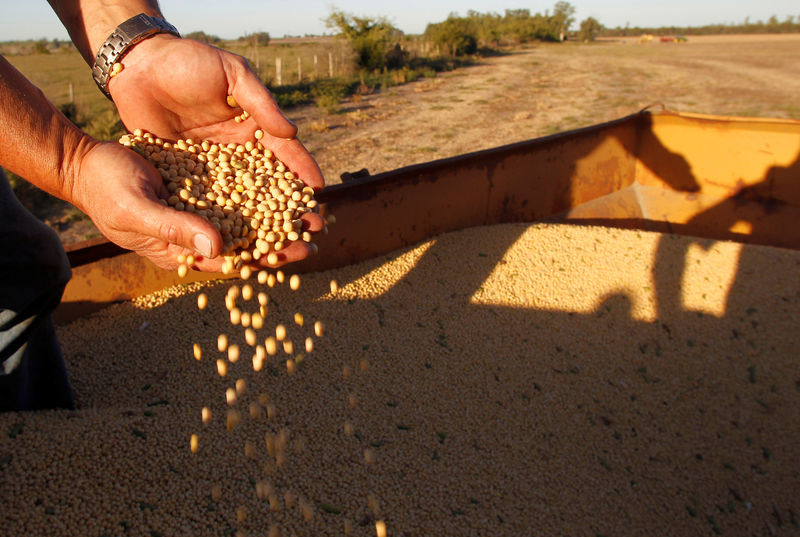(The opinions expressed here are those of the author, a market analyst for Reuters.)
By Karen Braun
CHICAGO, April 25 (Reuters) - Canada has not exactly declared a trade war on China, but it might seem that way for the country's canola farmers who have cut plantings for this year, somewhat mirroring the plight of U.S. soybean farmers across the southern border.
Statistics Canada on Wednesday published its survey-based planting outlook for 2019 including canola acres at 21.3 million acres, down 7 percent on the year and the smallest area since 2016. On average, market watchers were expecting a more modest decline to about 21.8 million. is the largest producer of canola and it exports about half its crop. China is the biggest buyer of Canadian canola, accounting for about 40 percent of exports last year. China crushes the canola to produce cooking oil and meal to feed pigs and fish.
China has a very similar footprint on the U.S. soybean market, accounting for about half of all shipments last year. But because of the trade war and Beijing's tariff on U.S. soybeans, exports to China were down 85 percent on the year in the first half of the current U.S. marketing year.
Canadian farmers are now getting a taste of what U.S. soybean growers have been going through as their product is likely being used as a tool in a political fight.
In early March, China cancelled the canola export registration of Richardson International, Canada's largest canola exporter. Another exporter, Viterra Inc, had its registration cancelled in late March. China said pests were detected in the shipments, a claim the exporters dispute. market participants presume the dispute over canola is attributable to Canada's December arrest of the chief financial officer of China-based Huawei Technologies Co Ltd HWT.UL , the world's largest telecommunications equipment maker, who faces U.S. criminal charges. If the troubles are truly based in diplomacy rather than product quality, the prospects of a resolution are probably even more unclear.
Canola futures have responded accordingly. ICE (NYSE:ICE) front-month canola futures RSc1 reached a more than four-year-low on Tuesday and have fallen more than 9 percent since the beginning of February. Weakness in U.S. soybean prices have also been an influence.
U.S. soybean futures Sv1 suffered a similar, albeit worse fate last year when the trade war with China was confirmed, and prices fell 14 percent in June alone. Today, most-active futures are 16 percent lower than a year ago.
Reduced canola output in Canada would tighten global supplies as Europe, the other main producer of rapeseed, had trouble sowing the crop last fall amid drought conditions. Insect damage has also plagued Western Europe, and analysts expect that the European Union's rapeseed crop could equal or fall short of last year's 20 million tonnes, which was a six-year low. Canada and the European Union countries account for about 58 percent of global rapeseed and canola production.
PLANTING CONFLICTIONS
With uncertainty over the future of canola trade with China, Canadian farmers appear reluctant to plant the oilseed based on the StatsCan survey. But the U.S. Department of Agriculture's Canada attaché has a different view.
Last month, USDA's Canada office set 2019 canola plantings at 9.3 million hectares or 22.98 million acres, up fractionally from the attaché's 2018 figure and notably above the StatsCan projection.
There were a few reasons for this assumption, one being that Canadian seed suppliers had recently confirmed that canola seed sales were strong and in line with forecasts, which was reported after farmers had likely booked all their product.
The trade problems with China were also considered, but the attaché did not think it would greatly impact planting, stressing canola's strong expected profitability along with healthy global demand for canola oil and meal. However, the report was published before China cancelled the second exporter's registration.
Perhaps the most interesting reason that USDA's Canadian branch did not reduce canola plantings is based on trade woes with India, the largest buyer of Canadian pulses, including lentils and peas. India imposed hefty tariffs on pulses in late 2017, driving down Canadian prices and ramping up stocks. The attaché saw area under lentils largely shifting to canola and grains.
The trade tensions between China and Canada are probably worse now than the attaché previously thought. If Canadian farmers have soured on both pulses and canola, this could drive them increasingly toward the grains, with which the world is already awash.
Canada is a major exporter of wheat, and StatsCan pegs all wheat area at 25.7 million acres, well above the trade estimate of 24.8 million. StatsCan also sees corn acres up nearly 5 percent on the year to 3.8 million acres.
The expectation for reduced canola area in Canada has already weighed on wheat prices, particularly Minneapolis futures. StatsCan confirmed the market's suspicion, placing spring wheat plantings at 19.4 million acres, an 18-year high.
Record stockpiles is another common ground shared between Canadian canola and U.S. soybeans, though the latter is much more severe. USDA forecasts 2018-19 canola ending stocks reaching a record 3.4 million tonnes in Canada, some 36 percent higher than in the previous year and 13 percent above 2013-14's high.
Meanwhile, U.S. soybean carryout is seen exploding to 24.4 million tonnes in 2018-19, more than double the previous year's supply and 56 percent above 2006-07's record. USDA projected last month that U.S. growers would cut soybean plantings by 5 percent in 2019 to 84.6 million acres.
It is uncertain how long the trade dispute between China and Canada will last, but U.S. farmers can testify that the reduced demand/overproduction situation is something Canadian canola farmers would want to avoid if possible. (Graphic: https://tmsnrt.rs/2DCQz4m)
<^^^^^^^^^^^^^^^^^^^^^^^^^^^^^^^^^^^^^^^^^^^^^^^^^^^^^^^^^^^ GRAPHIC: North American oilseed stocks-to-use
https://tmsnrt.rs/2DCQz4m
^^^^^^^^^^^^^^^^^^^^^^^^^^^^^^^^^^^^^^^^^^^^^^^^^^^^^^^^^^^> (Editing by Lisa Shumaker)
